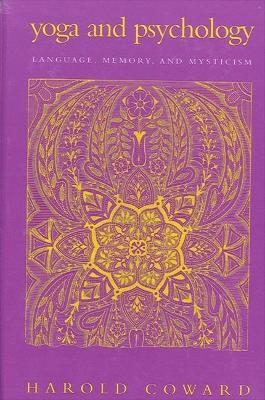
Yoga and Psychology
State University of New York Press (Verlag)
978-0-7914-5500-5 (ISBN)
Harold Coward explores how the psychological aspects of Yoga philosophy have been important to intellectual developments both East and West. Foundational for Hindu, Jaina, and Buddhist thought and spiritual practice, Patañjali's Yoga Sutras, the classical statement of Eastern Yoga, are unique in their emphasis on the nature and importance of psychological processes. Yoga's influence is explored in the work of both the seminal Indian thinker Bhartrhari (c. 600 C.E.) and among key figures in Western psychology: founders Freud and Jung, as well as contemporary transpersonalists such as Washburn, Tart, and Ornstein..
Coward shows how the yogic notion of psychological processes makes Bhartrhari's philosophy of language and his theology of revelation possible. He goes on to explore how Western psychology has been influenced by incorporating or rejecting Patañjali's Yoga. The implications of these trends in Western thought for mysticism and memory are examined as well. This analysis results in a notable insight, namely, that there is a crucial difference between Eastern and Western thought with regard to how limited or perfectible human nature is—the West maintaining that we as humans are psychologically, philosophically, and spiritually limited or flawed in nature and thus not perfectible, while Patañjali's Yoga and Eastern thought generally maintain the opposite. Different Western responses to the Eastern position are noted, from complete rejection by Freud, Jung, and Hick, to varying degrees of acceptance by transpersonal thinkers.
Harold Coward is with the Centre for Studies in Religion and Society at the University of Victoria. He is the author and editor of several books, including Jung and Eastern Thought and Derrida and Indian Philosophy, both published by SUNY Press.
Preface
1. Introduction
Part I. Yoga and Language
2. Agama in the Yoga Sutras of Patañjali
3. The Yoga Psychology Underlying Bhartrhari's Vakyapadiya
4. Yoga in the Vairagya-Sataka of Bhartrhari
Part II. Yoga and Western Psychology
5. Freud, Jung, and Yoga on Memory
6. Where Jung Draws the Line in His Acceptance of Patañjali's Yoga
7. Mysticism in Jung and Patañjali's Yoga
8. The Limits of Human Nature Yoga and Transpersonal Psychology
9. Conclusion
Notes
Glossary of Sanskrit Terms
Index
| Erscheint lt. Verlag | 24.10.2002 |
|---|---|
| Reihe/Serie | SUNY series in Religious Studies |
| Zusatzinfo | Total Illustrations: 0 |
| Verlagsort | Albany, NY |
| Sprache | englisch |
| Maße | 152 x 229 mm |
| Gewicht | 181 g |
| Themenwelt | Geisteswissenschaften ► Philosophie ► Geschichte der Philosophie |
| Geisteswissenschaften ► Philosophie ► Philosophie der Neuzeit | |
| Geisteswissenschaften ► Psychologie | |
| Geisteswissenschaften ► Religion / Theologie ► Hinduismus | |
| ISBN-10 | 0-7914-5500-9 / 0791455009 |
| ISBN-13 | 978-0-7914-5500-5 / 9780791455005 |
| Zustand | Neuware |
| Haben Sie eine Frage zum Produkt? |
aus dem Bereich


